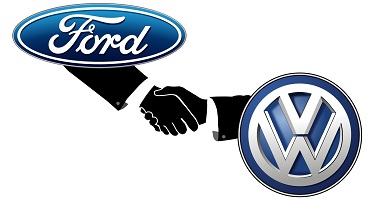Volkswagen AG and Ford Motor Co said on Tuesday they will join forces on commercial vans and pickups and are exploring shared development of electric and self-driving technology, actions meant to save the automakers billions of dollars.
Ford and VW announced their partnership against the backdrop of the Detroit auto show. The tie-up, which starts with sales of vans and medium-sized pickups in 2022, will not involve a merger or equity stakes, the companies said.
The expanding alliance, which will be governed by a joint committee that includes the CEOs of both companies, highlights the growing pressure on global automakers to manage the costs of developing electric and self-driving vehicles, as well as technology to meet tougher emissions standards for millions of internal combustion vehicles they will sell in coming years.
Ford will provide more details on how the alliance affects Ford’s regional operations in coming weeks, but does not expect any job cuts in Ford plants as a result of the alliance, Ford Chief Executive Officer Jim Hackett said.
Ford will engineer and build medium-sized pickups for both companies, Volkswagen said. Ford will also engineer and build larger commercial vans for European customers, while Volkswagen will develop and build a city van. Vans could be built in Ford’s plant in Turkey, VW said.
The companies estimate the commercial van and pickup cooperation will yield improved annual pretax operating results starting in 2023.
Ford and VW have signed a memorandum of understanding to jointly develop electric and self-driving vehicles, VW Chief Executive Officer Herbert Diess said.
VW shares were up 0.6 percent in Frankfurt. Ford gained 0.7 percent to $9.05 in pre-market U.S. trading.
U.S. AND CHINA SLOWDOWNS
Europe’s biggest automaker and the No. 2 U.S. automaker have been exploring closer cooperation as trade frictions force carmakers to rethink where they build vehicles for Europe, the United States and China. Slowdowns in the world’s largest auto markets – China and the United States – have ratcheted up the pressure to cut costs.
The tie-up with Volkswagen is a big bet for Ford’s Hackett since he took over in May 2017 from the ousted Mark Fields with the mandate to speed up decision-making and cut costs. Some analysts and investors have been frustrated by Ford’s laggard stock price and a perceived lack of details from Hackett about the Dearborn, Michigan-based automaker’s $11 billion (8.5 billion pounds) restructuring.
Last week, Ford said it would cut thousands of jobs, discontinue building money-losing vehicles and look at closing plants as part of a turnaround effort for its unprofitable European business.
Last month, Volkswagen announced another 3 billion euros ($3.4 billion) of cost cuts as part of its effort to improve profit margins and fund its shift to electric cars and automated driving.
Weak trading slams Citigroup’s revenue
On Monday, Volkswagen said it would invest $800 million to build an electric vehicle plant in Chattanooga, Tennessee, prompting U.S. President Donald Trump to congratulate the city and state in a post on Twitter the following day.
But the White House has been pushing to end subsidies on electric vehicles that would help the plant and the alliance.
